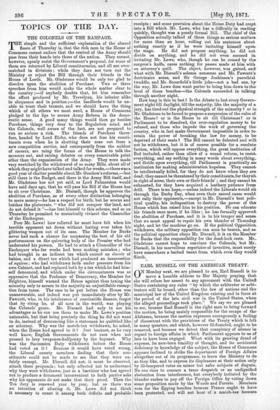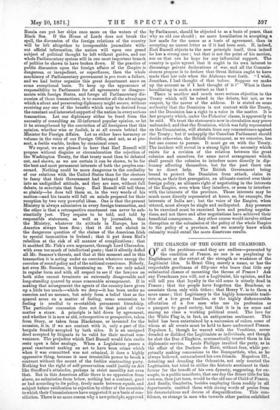EARL RUSSELL ON THE AMERICAN TREATY.
ON Monday next, we are pleased to see, Earl Russell is to. move a humble address to Her Majesty praying that. she will refuse her assent to any agreement with the Unite States containing any rules " by which the arbitrator or arbi- trators will be bound, other than the law of nations and the municipal law of the United Kingdom existing and in force at the period of the late civil war in the United States, when. the alleged proceedings took place." We say we are pleased to see, because Earl Russell is the right man to bring forward. the motion, he being mainly responsible for the escape of the Alabama, because the motion expresses courageously a feeling of discontent with the provisions of the Treaty which is felt in many quarters, and which, however ill-founded, ought to be removed, and because we detest that conspiracy of silence in regard to foreign affairs in which Parliament appears to us of late to have been engaged. What with its growing dread of expense, its new-born timidity of thought; and its accidental deficiency in knowledge of the subject, the House of Commons appears inclined to strike the department of Foreign Affairs altogether out of its programme, to leave the Ministry to do• as they like, and to express its displeasure at their action only by ill-tempered votes on minor but safer subjects of dispute. No one rises to censure a tame despatch or an undignified abstention from interference, but everybody irritated by the blunder rushes to pay off the Foreign Office by voting down some proposition made by the Woods and Forests. Members vote for the Epping beeches because France ought to have been protected, and will not hear of a match-tax because
Russia can put her ships once more on the waters of the Black Sea. If the House of Lords does not break the spell, the discussion of the foreign relations of the country will be left altogether to irresponsible journalists with- out official information, the nation will upon one grand subject of political thought be left without guides, and our whole Parliamentary system will in one most important branch of politics be shown to have broken down. If the practice of publio discussion upon the foreign affairs of the Empire is dangerous, or inexpedient, or superfluous, than the whole machinery of Parliamentary government is pro tanto a failure, and we had better organize this great department anew on some exceptional basis. To keep up the appearance of responsibility to Parliament for all agreements or disagree- ments with foreign States, and forego all Parliamentary dis- cussion of those transactions, is to surrender all the advantages which a silent and persevering diplomacy might secure, without receiving any one of the benefits which may be derived from the constant and interested support of the nation in everyserious transaction. Let our diplomacy either be freed from the necessity of consulting an ill-informed popular opinion, or let it be strengthened by the conviction of all foreigners that this opinion, whether wise or foolish, is at all events behind the Minister for Foreign Affairs. Let us either have harmony or volume in the voice of our Foreign Office, and not, as at pre- sent, a feeble warble, broken by occasional roars.
We repeat, we are pleased to hear that Earl Russell will propose without disguise or circumlocution the rejection of the Washington Treaty, for that treaty must then be debated out, and shown, as we are certain it can be shown, to be for the best and most permanent interests of both the peoples con- cerned. Nothing could be more dangerous to the cordiality of our relations with the United States than for the electors to fancy that their Government had betrayed the country into an undignified attitude, and they are sure, without full debate, to entertain that fancy. Earl Russell will tell them so plainly—he does tell them so, in the very words of his motion—and his taunts will fall on minds prepared for their reception by two very powerful ideas. One is that the present Ministry is always submissive in every foreign transaction, and the other is that a retrospective enactment can never be sub- stantially just. They require to be told, and told by responsible statesmen, as well as by journalists, that the Ministry, whatever its attitude in Europe, has in America always been firm ; that it did not shrink in the dangerous question of the claims of the American Irish to special immunities in Ireland ; that it put down Riel's rebellion at the risk of all manner of complications ; that it snubbed Mr. Fish's own argument, through Lord Clarendon, with even too much of intellectual gusto ; that it silently defied all Mr. Sumner's threats, and that at this moment and in this transaction it is acting under no coercion whatever except the coercion of sound policy and of the national conscience. Nobody, not even Mr. Sumner, is threatening us. We are only asked in regular form and with all respect to see if the lawyers on both aides cannot terminate an extremely disagreeable and long-standing quarrel by some reasonable arrangement. If in making that arrangement the agents of the country have given up a little too much—which we deny—it has been under no coercion and no menace, but solely from a belief that as the quarrel arose on a matter of feeling, some concession to feeling is needful to re-establish permanent friendship. The particular concession does not in that point of view matter a straw. A principle is laid down by agreement, and whether it is new or old, retrospective or prospective, taken from Story, or taken from Blackstone, or invented for the occasion, it is, if we are content with it, only a part of the bargain frankly accepted by both sides. It is an unsigned deed accepted by litigants to be valid for their mutual con- venience. The prejudice which Earl Russell would fain excite rests upon a false analogy. When a Legislature passes a penal enactment making an act to have been crime which when it was committed was not criminal, it does a highly oppressive thing, because it uses irresistible power to break a
contract without the assent of the feebler contracting party. Nothing but the right of self-preservation could justify an Act like Strafford's attainder, perhaps in strict morality not even that. But in this American affair there is no oppression from above, no submission from below, nothing but a contract, good or bad according to its policy, freely made between equals, and subject before ratification to rejection by either of the countries to which their Commissioners have suggested it as a basis of con- ciliation. There is no more reason why a newprinciple, approved by Parliament, should be objected to as a basis of peace, than why an old one should ; no more humiliation in accepting a law made for the nonce as a basis of agreement, than in accepting an unsent letter as if it had been sent. If, indeed, Earl Russell objects to the new principle itself, then indeed he has a strong case ; but that is not the point of his motion, nor on that can he hope for any influential support. The country is quite agreed that it ought in its own interest to discourage private declarations of war, and all the Commis- sioners propose is to declare that Great Britain ought to have made that her rule when the Alabama went forth. "I wish, Jonathan, I had thought of that before. Suppose we make up the account as if I had thought of it V" What is there humiliating in such a contract as that ?
There is another and much more serious objection to the Treaty which will be raised in the debate, but not, as we suspect, by the mover of the address. It is stated on some authority that the Dominion is not content with the Treaty, and the Dominion has a right to a voice in the matter. It is her property which, under the Fisheries' clause, is apparently to be sold. We trust the statements now in circulation may prove unfounded, and that the Dominion, which was fully represented on the Commission, will abstain from any remonstrance against the Treaty ; but if unhappily the Canadian Parliament should decide otherwise, the British Government, as we conceive, has but one course to pursue. It must go on with the Treaty. The incident will reveal in a strong light the necessity which exists for a revision of the relation between the great colonies and ourselves, for some novel arrangement which shall permit the colonies to interfere more directly in dip- lomacy affecting themselves, but for the past there can be no direct help. The British Government being bound to protect the Dominion from attack, claim in return, as their first prerogative, an ultimate control over their foreign policy, an ultimate right of negotiating in the interests of the Empire, even when they interfere, or seem to interfere with the interests of the province. Those interests may be much more directly represented at home, as, for example, the interests of India are ; but the voice of the Empire, when uttered, must always be single and undisputed. Any pressure to be exercised must be exercised here and pending negotia- tions, and not there and after negotiations have achieved their beneficial consequence. Any other course would involve either disruption or the submission of the policy of the whole Empire to the policy of a province, and we scarcely know which calamity would entail the more disastrous results.



































 Previous page
Previous page